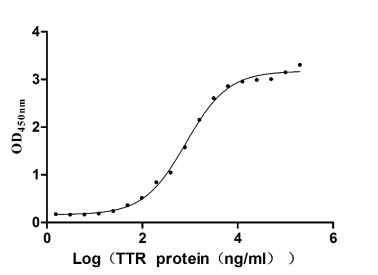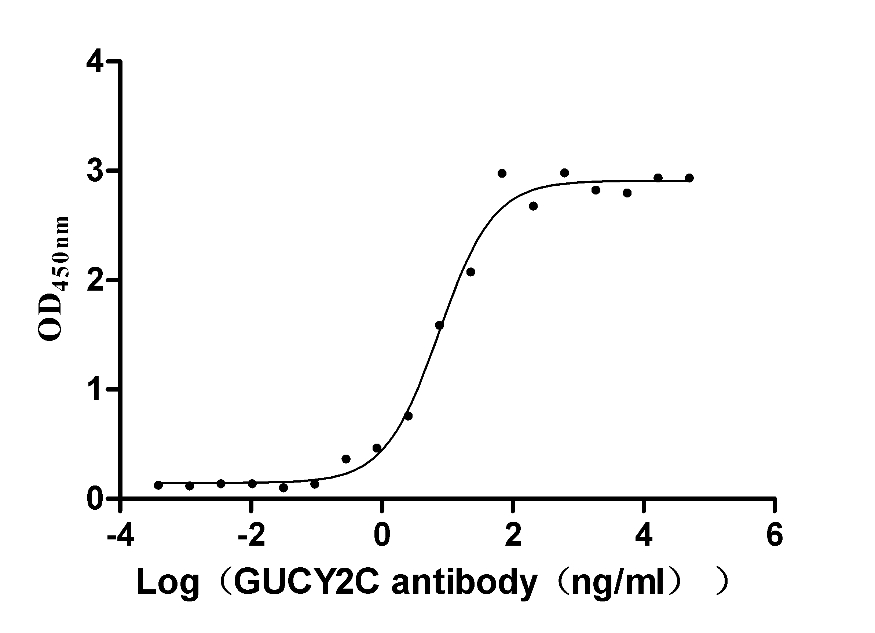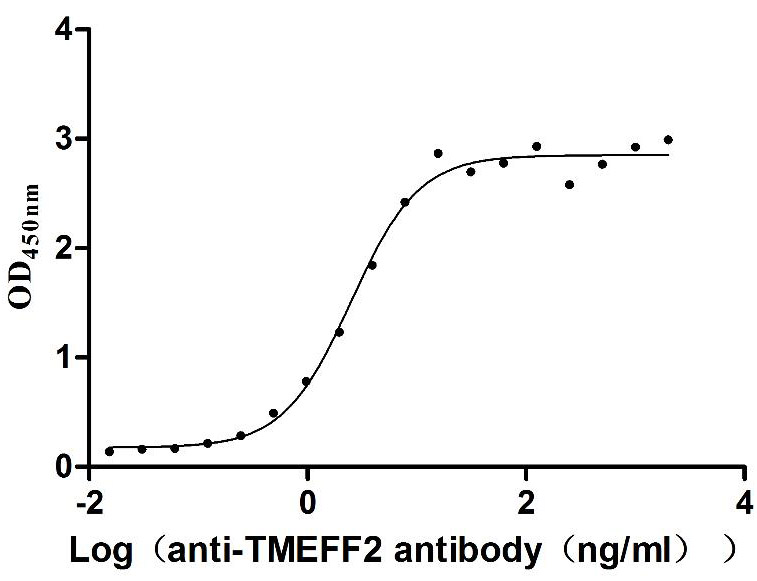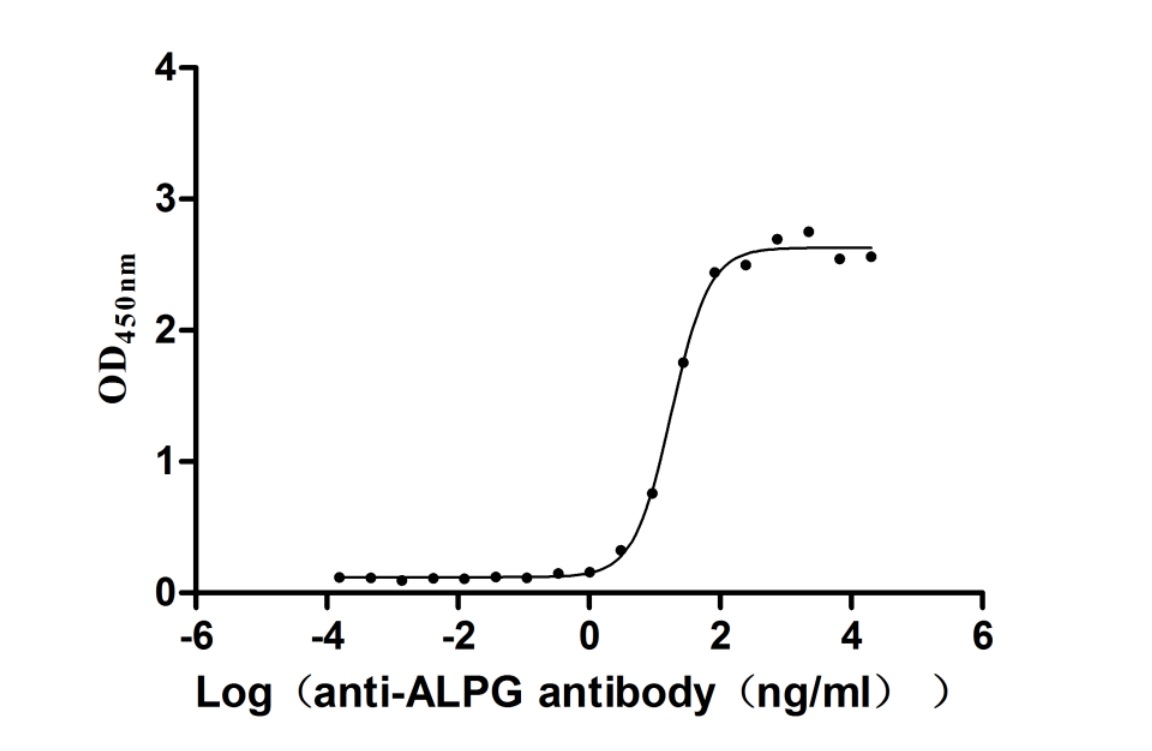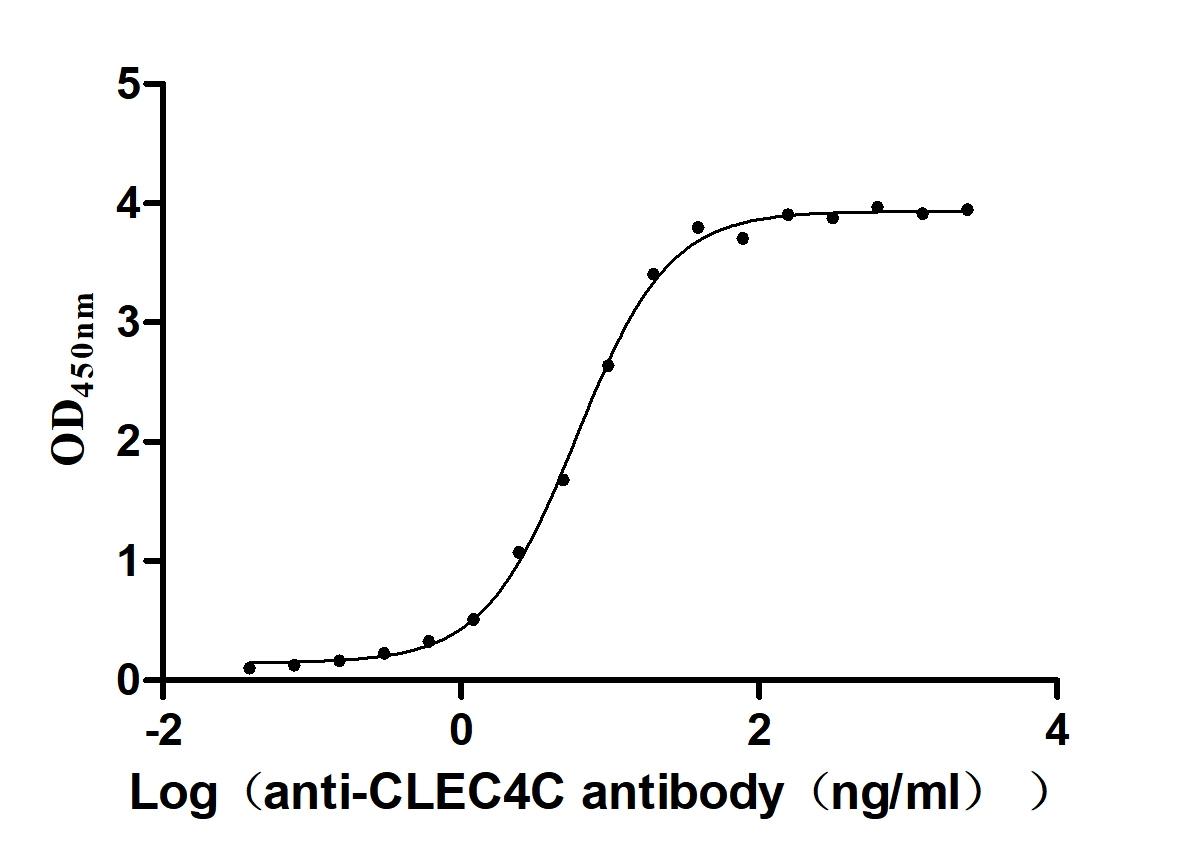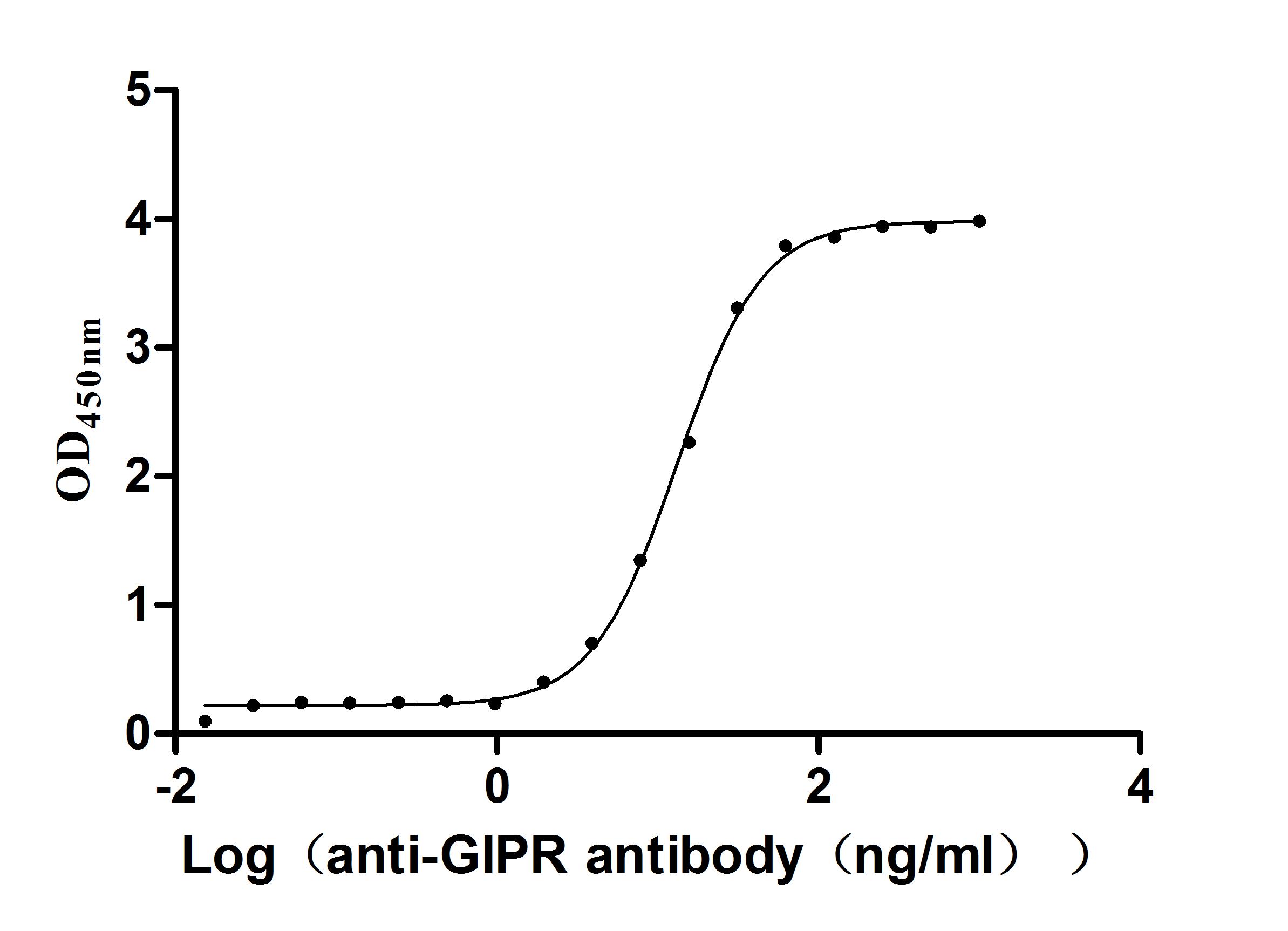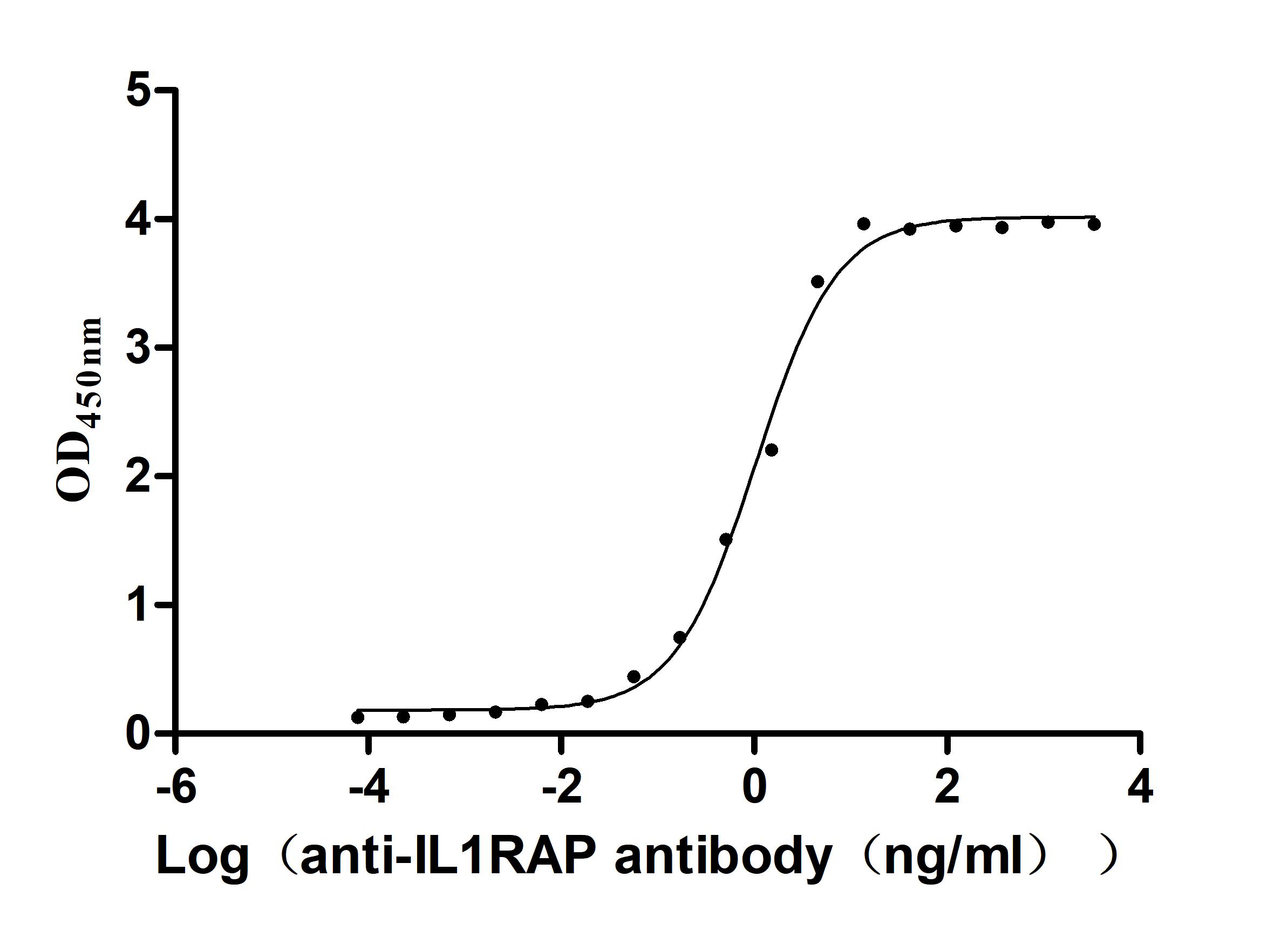Recombinant Human T-box transcription factor TBX3 (TBX3)
-
货号:CSB-YP023255HU
-
规格:
-
来源:Yeast
-
其他:
-
货号:CSB-EP023255HU
-
规格:
-
来源:E.coli
-
其他:
-
货号:CSB-EP023255HU-B
-
规格:
-
来源:E.coli
-
共轭:Avi-tag Biotinylated
E. coli biotin ligase (BirA) is highly specific in covalently attaching biotin to the 15 amino acid AviTag peptide. This recombinant protein was biotinylated in vivo by AviTag-BirA technology, which method is BriA catalyzes amide linkage between the biotin and the specific lysine of the AviTag.
-
其他:
-
货号:CSB-BP023255HU
-
规格:
-
来源:Baculovirus
-
其他:
-
货号:CSB-MP023255HU
-
规格:
-
来源:Mammalian cell
-
其他:
产品详情
-
纯度:>85% (SDS-PAGE)
-
基因名:
-
Uniprot No.:
-
别名:Bladder cancer related protein XHL; T box 3; T-box protein 3; T-box transcription factor TBX3; Tbx3; TBX3 ISO; TBX3_HUMAN; UMS; XHL
-
种属:Homo sapiens (Human)
-
蛋白长度:Full length protein
-
表达区域:1-743
-
氨基酸序列MSLSMRDPVI PGTSMAYHPF LPHRAPDFAM SAVLGHQPPF FPALTLPPNG AAALSLPGAL AKPIMDQLVG AAETGIPFSS LGPQAHLRPL KTMEPEEEVE DDPKVHLEAK ELWDQFHKRG TEMVITKSGR RMFPPFKVRC SGLDKKAKYI LLMDIIAADD CRYKFHNSRW MVAGKADPEM PKRMYIHPDS PATGEQWMSK VVTFHKLKLT NNISDKHGFT LAFPSDHATW QGNYSFGTQT ILNSMHKYQP RFHIVRANDI LKLPYSTFRT YLFPETEFIA VTAYQNDKIT QLKIDNNPFA KGFRDTGNGR REKRKQLTLQ SMRVFDERHK KENGTSDESS SEQAAFNCFA QASSPAASTV GTSNLKDLCP SEGESDAEAE SKEEHGPEAC DAAKISTTTS EEPCRDKGSP AVKAHLFAAE RPRDSGRLDK ASPDSRHSPA TISSSTRGLG AEERRSPVRE GTAPAKVEEA RALPGKEAFA PLTVQTDAAA AHLAQGPLPG LGFAPGLAGQ QFFNGHPLFL HPSQFAMGGA FSSMAAAGMG PLLATVSGAS TGVSGLDSTA MASAAAAQGL SGASAATLPF HLQQHVLASQ GLAMSPFGSL FPYPYTYMAA AAAASSAAAS SSVHRHPFLN LNTMRPRLRY SPYSIPVPVP DGSSLLTTAL PSMAAAAGPL DGKVAALAAS PASVAVDSGS ELNSRSSTLS SSSMSLSPKL CAEKEAATSE LQSIQRLVSG LEAKPDRSRS ASP
-
蛋白标签:Tag type will be determined during the manufacturing process.
The tag type will be determined during production process. If you have specified tag type, please tell us and we will develop the specified tag preferentially. -
产品提供形式:Lyophilized powder
Note: We will preferentially ship the format that we have in stock, however, if you have any special requirement for the format, please remark your requirement when placing the order, we will prepare according to your demand. -
复溶:We recommend that this vial be briefly centrifuged prior to opening to bring the contents to the bottom. Please reconstitute protein in deionized sterile water to a concentration of 0.1-1.0 mg/mL.We recommend to add 5-50% of glycerol (final concentration) and aliquot for long-term storage at -20℃/-80℃. Our default final concentration of glycerol is 50%. Customers could use it as reference.
-
储存条件:Store at -20°C/-80°C upon receipt, aliquoting is necessary for mutiple use. Avoid repeated freeze-thaw cycles.
-
保质期:The shelf life is related to many factors, storage state, buffer ingredients, storage temperature and the stability of the protein itself.
Generally, the shelf life of liquid form is 6 months at -20°C/-80°C. The shelf life of lyophilized form is 12 months at -20°C/-80°C. -
货期:Delivery time may differ from different purchasing way or location, please kindly consult your local distributors for specific delivery time.Note: All of our proteins are default shipped with normal blue ice packs, if you request to ship with dry ice, please communicate with us in advance and extra fees will be charged.
-
注意事项:Repeated freezing and thawing is not recommended. Store working aliquots at 4°C for up to one week.
-
Datasheet :Please contact us to get it.
相关产品
靶点详情
-
功能:Transcriptional repressor involved in developmental processes. Binds to the palindromic T site 5'-TTCACACCTAGGTGTGAA-3' DNA sequence, or a half-site, which are present in the regulatory region of several genes. Probably plays a role in limb pattern formation. Required for mammary placode induction, and maintenance of the mammary buds during development. Involved in branching morphogenesis in both developing lungs and adult mammary glands, via negative modulation of target genes; acting redundantly with TBX2. Required, together with TBX2, to maintain cell proliferation in the embryonic lung mesenchyme; perhaps acting downstream of SHH, BMP and TGFbeta signaling. Involved in modulating early inner ear development, acting independently of, and also redundantly with, TBX2 in different subregions of the developing ear. Acts as a negative regulator of PML function in cellular senescence.
-
基因功能参考文献:
- TBX3 is not only required for development of posterior forelimb bones (ulna and digits 4 and 5), but also for a subset of posterior muscles (lateral triceps and brachialis) and their bone eminence attachment sites. PMID: 27491074
- High TBX3 expression is associated with invasive breast cancer. PMID: 27553211
- genetic variation of Tbx3 is associated with left ventricular mass in a healthy Japanese population [meta-analysis] PMID: 27195777
- Study demonstrates that miR-206 directly targets Tbx3, that miR-206 and Tbx3 mRNA are inversely correlated in human breast cancer and that Tbx3 repression is necessary to elicit a significant functional effect of miR-206 in breast cancer cells. PMID: 27100732
- The c.1423C>T (p.Q475*) nonsense mutation in exon 6 of the TBX3 gene associated with ulnar-mammary syndrome. PMID: 28145909
- Tbx3 was found to be overexpressed in 46 of 98 human gastric cancer samples PMID: 27553355
- Paracrine WNT signaling is stimulated by estrogen and progesterone, while autocrine WNT signaling is induced by the embryonic T-box transcription factor TBX3 PMID: 25350852
- Overexpression of Tbx3 is associated with pancreatic carcinoma. PMID: 25743805
- Polymorphisms in several genes involved in the Wnt signaling pathway were associated with hepatic fibrosis or inflammation risk in HCV-infected males. PMID: 24386373
- TBX3 gene variants may contribute to indirect inguinal hernia as a rare risk factor by reducing TBX3 levels PMID: 25455105
- An enhancement in TBX3 protein expression both in glomerular and tubular regions. PMID: 25158279
- The pleiotropic effects of TBX3 mutations in humans and mice likely result from disrupting at least two molecular functions of this protein: transcriptional regulation and pre-mRNA splicing. PMID: 24675841
- TBX3 may play an important role as a reciprocal switch between substrate dependent cell proliferation and tumour invasion. PMID: 24098938
- TBX3 plays a pivotal role in mediating the antiproliferative and promigratory role of TGF-beta1 in breast epithelial cells and skin keratinocytes. PMID: 24025717
- TBX3 exon 2 mutation is rare in most human tumors PMID: 23656610
- Oncogenic B-RAF(V600E) signaling induces the T-Box3 transcriptional repressor to repress E-cadherin and enhance melanoma cell invasion. PMID: 23190890
- TBX3 gene polymorphism is associated in the development of colorectal cancers. PMID: 23266556
- Data show that Tbx3 is up-regulated in tissue samples of head and neck squamous cell cancer (HNSCC) patients and that Tbx3 represses PTEN transcription. PMID: 23082988
- the sequence variants within the TBX3 gene promoter did not contribute to VSD etiology. PMID: 23116943
- TBX3 promotes human embryonic stem cell proliferation and neuroepithelial differentiation in a differentiation stage-dependent manner. PMID: 22865636
- TBX3 CPG island methylation predicts progression in bladder cancer. PMID: 22284968
- Tbx3 overexpression promotes squamous carcinoma cell survival displaying an epithelial-mesenchymal transition phenotype. PMID: 22154512
- In situ hybridization reveals Tbx3 and Sox4 to co-localize extensively in the embryo including the atrioventricular and outflow tract cushion mesenchyme and a small area of interventricular myocardium. PMID: 21538160
- identify a Sp1 element and two CCAAT boxes to be essential for basal TBX3 promoter activity PMID: 21784138
- Study indicate mutation of TBX3 gene in the family. PMID: 21199695
- Tbx3 expression was found to be suppressed by AFLL when the expression of tumor suppressor genes p14 and p53 were activated PMID: 20702496
- Data show that estrogen signaling expands the pool of functional breast cancer stem-like cells through a paracrine FGF/FGFR/Tbx3 signaling pathway. PMID: 21098263
- pathway that up-regulates TBX3 expression and provides additional evidence that increased levels of TBX3 contribute to metastasis. PMID: 20942798
- TBX3 mRNA expression was significantly higher in metastatic breast cancer than in non-metastatic tumors. PMID: 19218121
- Studies identified Tbx3 as a key regulator of the SAN phenotype. PMID: 20133910
- The mRNA and protein expressions of Tbx3 are markedly upregulated in breast cancer cell lines and tissue samples. PMID: 19403417
- Mutations in Tbx3 are responsible for ulnar-mammary syndrome (UMS), an autosomal dominant disorder affecting limb, tooth, hair, apocrine gland and genital development. PMID: 11689487
- Results demonstrate the structural consequences of T-box domain protein 3 point mutations observed in Ulnar-Mammary syndrome and Holt-Oram syndrome patients. PMID: 12005433
- The results are consistent with the previous finding that UMS is caused by haploinsufficiency of TBX3. PMID: 12116211
- Overexpression of TBX3 is associated with breast cancer PMID: 15289316
- increased expression of truncated cSHMT, Tbx3 and utrophin in plasma samples obtained from patients at early stages of ovarian cancer and breast cancer PMID: 16049973
- A literature review of TBX3 combined with a novel TBX3 mutation in a family with ulnar-mammary syndrome finds an association in mutations that disrupt the TBX3 DNA-binding domain and a higher frequency of severe upper limb malformations and teeth defects. PMID: 16530712
- Required for heart and limb formation, and is mutated in ulnar-mammary syndrome. PMID: 16556916
- Data show that Tbx3 plays an important role in osteogenic differentiation and proliferation of human mesenchymal stem cells derived from adipose tissue. PMID: 16955224
- Nyx2-5 confines recombinant hTBX3 expression to the sinoatrial node & sinus horns in mice. Tbx3 suppresses chamber differentiation--another mechanism by which the Tbx3-positive sinoatrial node is shielded from differentiating into atrial myocardium. PMID: 17234970
- TBX3 repression to its targets is dependent on HDAC activity. TBX3 may serve as a biomarker for breast cancer. PMID: 18245468
显示更多
收起更多
-
相关疾病:Ulnar-mammary syndrome (UMS)
-
亚细胞定位:Nucleus.
-
组织特异性:Widely expressed.
-
数据库链接:
HGNC: 11602
OMIM: 181450
KEGG: hsa:6926
STRING: 9606.ENSP00000257566
UniGene: Hs.744016
Most popular with customers
-
Recombinant Human Retinol-binding protein 4 (RBP4) (Active)
Express system: Mammalian cell
Species: Homo sapiens (Human)
-
Recombinant Human Heat-stable enterotoxin receptor (GUCY2C), partial (Active)
Express system: Mammalian cell
Species: Homo sapiens (Human)
-
Recombinant Human Tomoregulin-2 (TMEFF2), partial (Active)
Express system: Mammalian cell
Species: Homo sapiens (Human)
-
Recombinant Human Alkaline phosphatase, germ cell type (ALPG) (Active)
Express system: Mammalian cell
Species: Homo sapiens (Human)
-
Recombinant Macaca fascicularis C-type lectin domain family 4 member C(CLEC4C), partial (Active)
Express system: Mammalian cell
Species: Macaca fascicularis (Crab-eating macaque) (Cynomolgus monkey)
-
Recombinant Human Dipeptidase 3(DPEP3), partial (Active)
Express system: Mammalian cell
Species: Homo sapiens (Human)
-
Recombinant Macaca Gastric inhibitory polypeptide receptor(GIPR), partial (Active)
Express system: yeast
Species: Macaca fascicularis (Crab-eating macaque) (Cynomolgus monkey)
-
Recombinant Macaca fascicularis Interleukin 1 receptor accessory protein(IL1RAP), partial (Active)
Express system: Mammalian cell
Species: Macaca fascicularis (Crab-eating macaque) (Cynomolgus monkey)


